Flybe: Passenger Travel Decisions, Strategies, and Tour Industry
VerifiedAdded on 2020/11/12
|16
|3874
|68
Report
AI Summary
This report provides a comprehensive analysis of Flybe, a British airline, exploring various factors influencing passenger travel decisions. It delves into the significance of factors like appeal, convenience, prior experience, price, and trip purpose. The report then examines Porter's generic strategies (cost leadership, differentiation, cost focus, and differentiation focus) and their potential application to Flybe. Furthermore, it investigates the tour operation industry, differentiating between inbound, outbound, and domestic operators and their roles. The study also addresses the retail travel environment and the relationships between retail agencies, providing a holistic view of Flybe's operations and its position within the travel and tourism sector. The report aims to provide insights into how Flybe can attract and retain passengers, leverage strategic frameworks, and navigate the complexities of the industry.
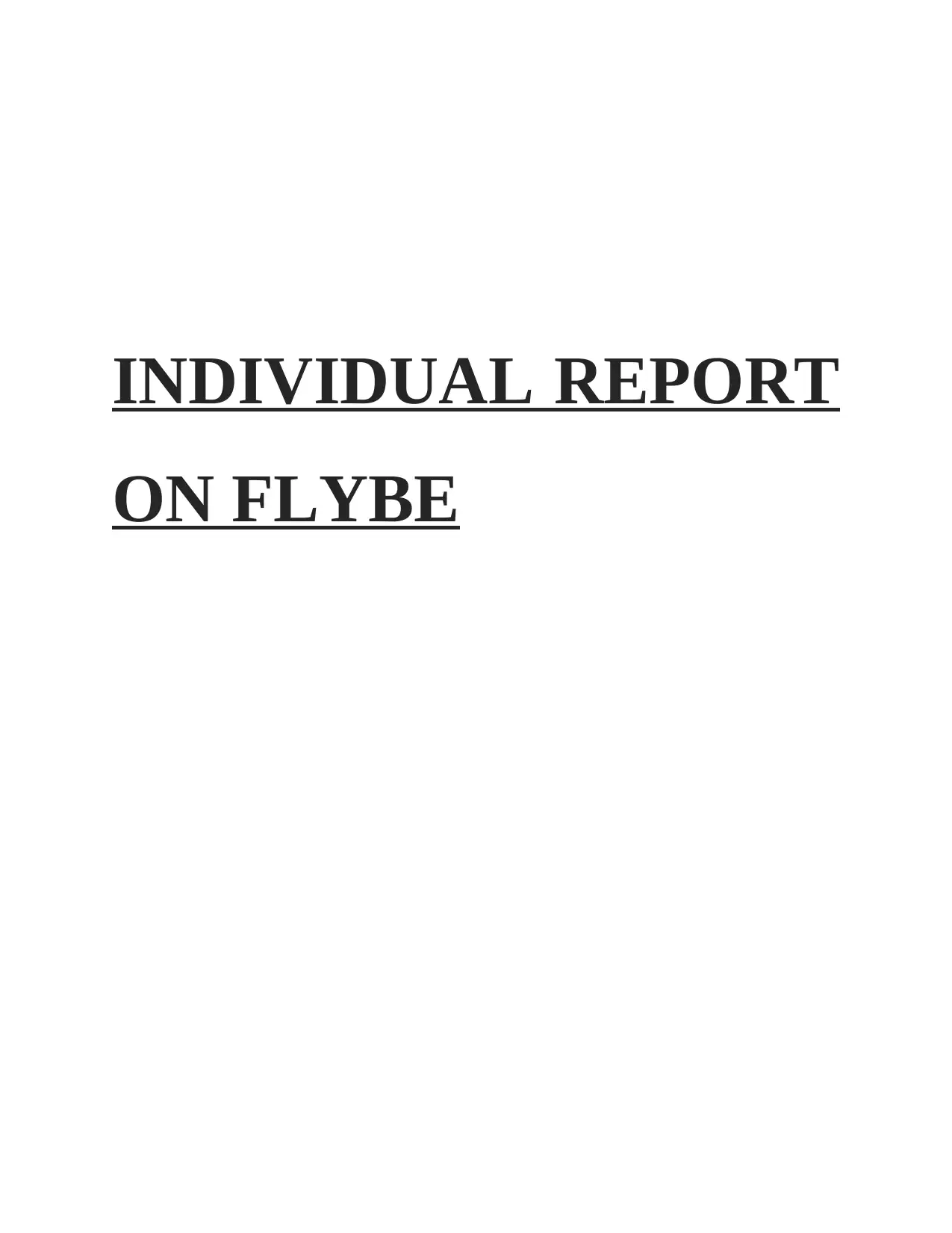
INDIVIDUAL REPORT
ON FLYBE
ON FLYBE
Paraphrase This Document
Need a fresh take? Get an instant paraphrase of this document with our AI Paraphraser
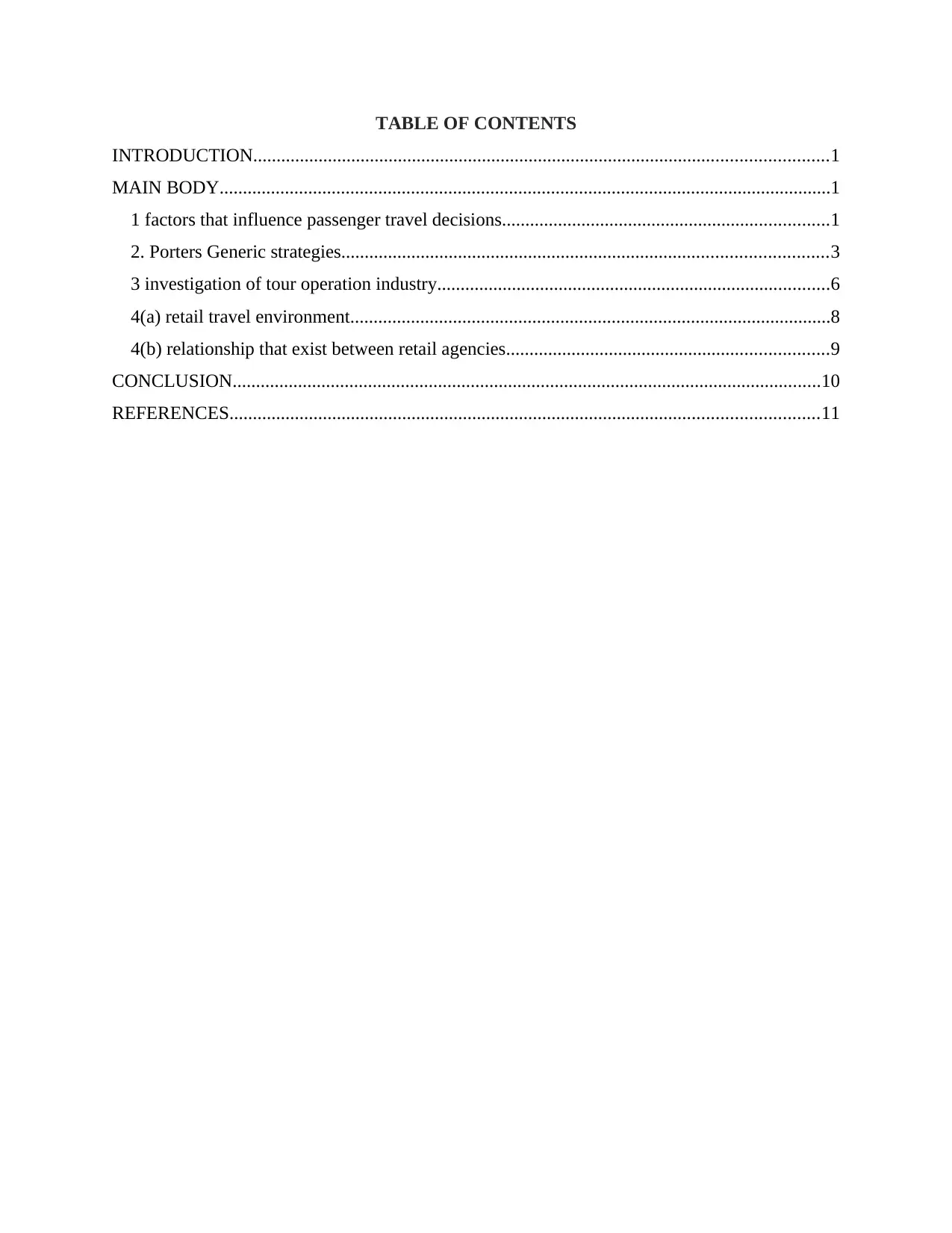
TABLE OF CONTENTS
INTRODUCTION...........................................................................................................................1
MAIN BODY...................................................................................................................................1
1 factors that influence passenger travel decisions......................................................................1
2. Porters Generic strategies........................................................................................................3
3 investigation of tour operation industry....................................................................................6
4(a) retail travel environment.......................................................................................................8
4(b) relationship that exist between retail agencies.....................................................................9
CONCLUSION..............................................................................................................................10
REFERENCES..............................................................................................................................11
INTRODUCTION...........................................................................................................................1
MAIN BODY...................................................................................................................................1
1 factors that influence passenger travel decisions......................................................................1
2. Porters Generic strategies........................................................................................................3
3 investigation of tour operation industry....................................................................................6
4(a) retail travel environment.......................................................................................................8
4(b) relationship that exist between retail agencies.....................................................................9
CONCLUSION..............................................................................................................................10
REFERENCES..............................................................................................................................11
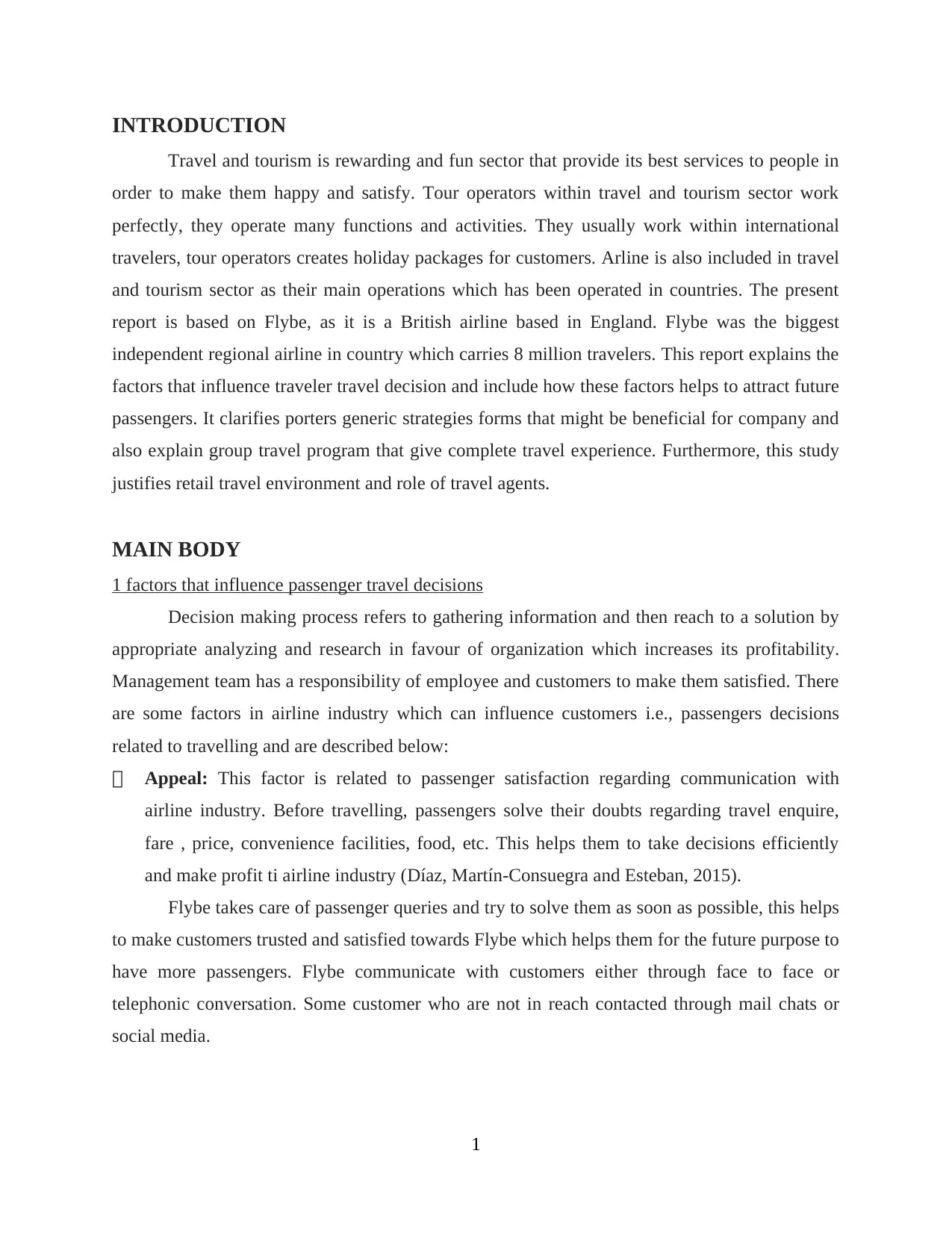
INTRODUCTION
Travel and tourism is rewarding and fun sector that provide its best services to people in
order to make them happy and satisfy. Tour operators within travel and tourism sector work
perfectly, they operate many functions and activities. They usually work within international
travelers, tour operators creates holiday packages for customers. Arline is also included in travel
and tourism sector as their main operations which has been operated in countries. The present
report is based on Flybe, as it is a British airline based in England. Flybe was the biggest
independent regional airline in country which carries 8 million travelers. This report explains the
factors that influence traveler travel decision and include how these factors helps to attract future
passengers. It clarifies porters generic strategies forms that might be beneficial for company and
also explain group travel program that give complete travel experience. Furthermore, this study
justifies retail travel environment and role of travel agents.
MAIN BODY
1 factors that influence passenger travel decisions
Decision making process refers to gathering information and then reach to a solution by
appropriate analyzing and research in favour of organization which increases its profitability.
Management team has a responsibility of employee and customers to make them satisfied. There
are some factors in airline industry which can influence customers i.e., passengers decisions
related to travelling and are described below:
Appeal: This factor is related to passenger satisfaction regarding communication with
airline industry. Before travelling, passengers solve their doubts regarding travel enquire,
fare , price, convenience facilities, food, etc. This helps them to take decisions efficiently
and make profit ti airline industry (Díaz, Martín-Consuegra and Esteban, 2015).
Flybe takes care of passenger queries and try to solve them as soon as possible, this helps
to make customers trusted and satisfied towards Flybe which helps them for the future purpose to
have more passengers. Flybe communicate with customers either through face to face or
telephonic conversation. Some customer who are not in reach contacted through mail chats or
social media.
1
Travel and tourism is rewarding and fun sector that provide its best services to people in
order to make them happy and satisfy. Tour operators within travel and tourism sector work
perfectly, they operate many functions and activities. They usually work within international
travelers, tour operators creates holiday packages for customers. Arline is also included in travel
and tourism sector as their main operations which has been operated in countries. The present
report is based on Flybe, as it is a British airline based in England. Flybe was the biggest
independent regional airline in country which carries 8 million travelers. This report explains the
factors that influence traveler travel decision and include how these factors helps to attract future
passengers. It clarifies porters generic strategies forms that might be beneficial for company and
also explain group travel program that give complete travel experience. Furthermore, this study
justifies retail travel environment and role of travel agents.
MAIN BODY
1 factors that influence passenger travel decisions
Decision making process refers to gathering information and then reach to a solution by
appropriate analyzing and research in favour of organization which increases its profitability.
Management team has a responsibility of employee and customers to make them satisfied. There
are some factors in airline industry which can influence customers i.e., passengers decisions
related to travelling and are described below:
Appeal: This factor is related to passenger satisfaction regarding communication with
airline industry. Before travelling, passengers solve their doubts regarding travel enquire,
fare , price, convenience facilities, food, etc. This helps them to take decisions efficiently
and make profit ti airline industry (Díaz, Martín-Consuegra and Esteban, 2015).
Flybe takes care of passenger queries and try to solve them as soon as possible, this helps
to make customers trusted and satisfied towards Flybe which helps them for the future purpose to
have more passengers. Flybe communicate with customers either through face to face or
telephonic conversation. Some customer who are not in reach contacted through mail chats or
social media.
1
⊘ This is a preview!⊘
Do you want full access?
Subscribe today to unlock all pages.

Trusted by 1+ million students worldwide
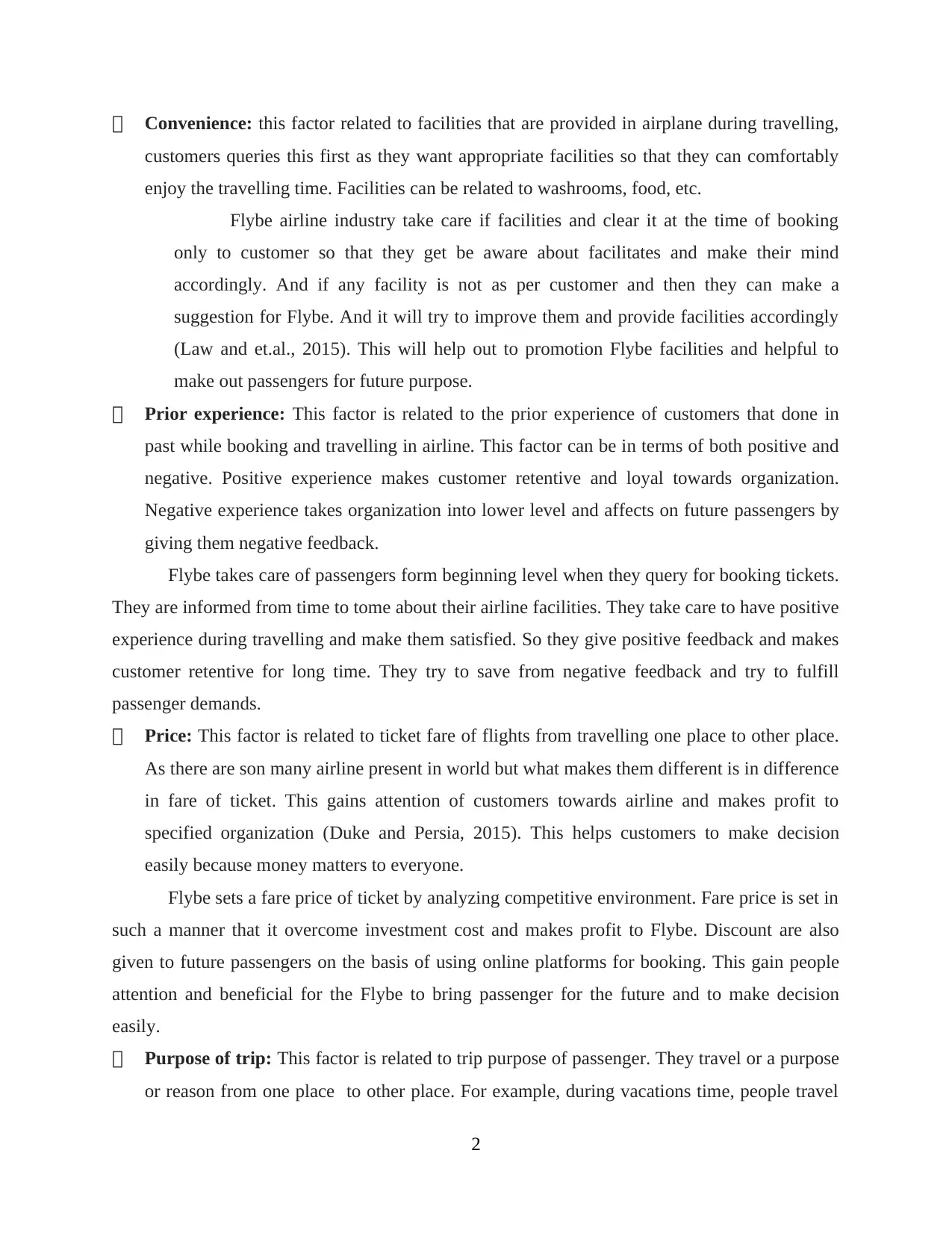
Convenience: this factor related to facilities that are provided in airplane during travelling,
customers queries this first as they want appropriate facilities so that they can comfortably
enjoy the travelling time. Facilities can be related to washrooms, food, etc.
Flybe airline industry take care if facilities and clear it at the time of booking
only to customer so that they get be aware about facilitates and make their mind
accordingly. And if any facility is not as per customer and then they can make a
suggestion for Flybe. And it will try to improve them and provide facilities accordingly
(Law and et.al., 2015). This will help out to promotion Flybe facilities and helpful to
make out passengers for future purpose.
Prior experience: This factor is related to the prior experience of customers that done in
past while booking and travelling in airline. This factor can be in terms of both positive and
negative. Positive experience makes customer retentive and loyal towards organization.
Negative experience takes organization into lower level and affects on future passengers by
giving them negative feedback.
Flybe takes care of passengers form beginning level when they query for booking tickets.
They are informed from time to tome about their airline facilities. They take care to have positive
experience during travelling and make them satisfied. So they give positive feedback and makes
customer retentive for long time. They try to save from negative feedback and try to fulfill
passenger demands.
Price: This factor is related to ticket fare of flights from travelling one place to other place.
As there are son many airline present in world but what makes them different is in difference
in fare of ticket. This gains attention of customers towards airline and makes profit to
specified organization (Duke and Persia, 2015). This helps customers to make decision
easily because money matters to everyone.
Flybe sets a fare price of ticket by analyzing competitive environment. Fare price is set in
such a manner that it overcome investment cost and makes profit to Flybe. Discount are also
given to future passengers on the basis of using online platforms for booking. This gain people
attention and beneficial for the Flybe to bring passenger for the future and to make decision
easily.
Purpose of trip: This factor is related to trip purpose of passenger. They travel or a purpose
or reason from one place to other place. For example, during vacations time, people travel
2
customers queries this first as they want appropriate facilities so that they can comfortably
enjoy the travelling time. Facilities can be related to washrooms, food, etc.
Flybe airline industry take care if facilities and clear it at the time of booking
only to customer so that they get be aware about facilitates and make their mind
accordingly. And if any facility is not as per customer and then they can make a
suggestion for Flybe. And it will try to improve them and provide facilities accordingly
(Law and et.al., 2015). This will help out to promotion Flybe facilities and helpful to
make out passengers for future purpose.
Prior experience: This factor is related to the prior experience of customers that done in
past while booking and travelling in airline. This factor can be in terms of both positive and
negative. Positive experience makes customer retentive and loyal towards organization.
Negative experience takes organization into lower level and affects on future passengers by
giving them negative feedback.
Flybe takes care of passengers form beginning level when they query for booking tickets.
They are informed from time to tome about their airline facilities. They take care to have positive
experience during travelling and make them satisfied. So they give positive feedback and makes
customer retentive for long time. They try to save from negative feedback and try to fulfill
passenger demands.
Price: This factor is related to ticket fare of flights from travelling one place to other place.
As there are son many airline present in world but what makes them different is in difference
in fare of ticket. This gains attention of customers towards airline and makes profit to
specified organization (Duke and Persia, 2015). This helps customers to make decision
easily because money matters to everyone.
Flybe sets a fare price of ticket by analyzing competitive environment. Fare price is set in
such a manner that it overcome investment cost and makes profit to Flybe. Discount are also
given to future passengers on the basis of using online platforms for booking. This gain people
attention and beneficial for the Flybe to bring passenger for the future and to make decision
easily.
Purpose of trip: This factor is related to trip purpose of passenger. They travel or a purpose
or reason from one place to other place. For example, during vacations time, people travel
2
Paraphrase This Document
Need a fresh take? Get an instant paraphrase of this document with our AI Paraphraser
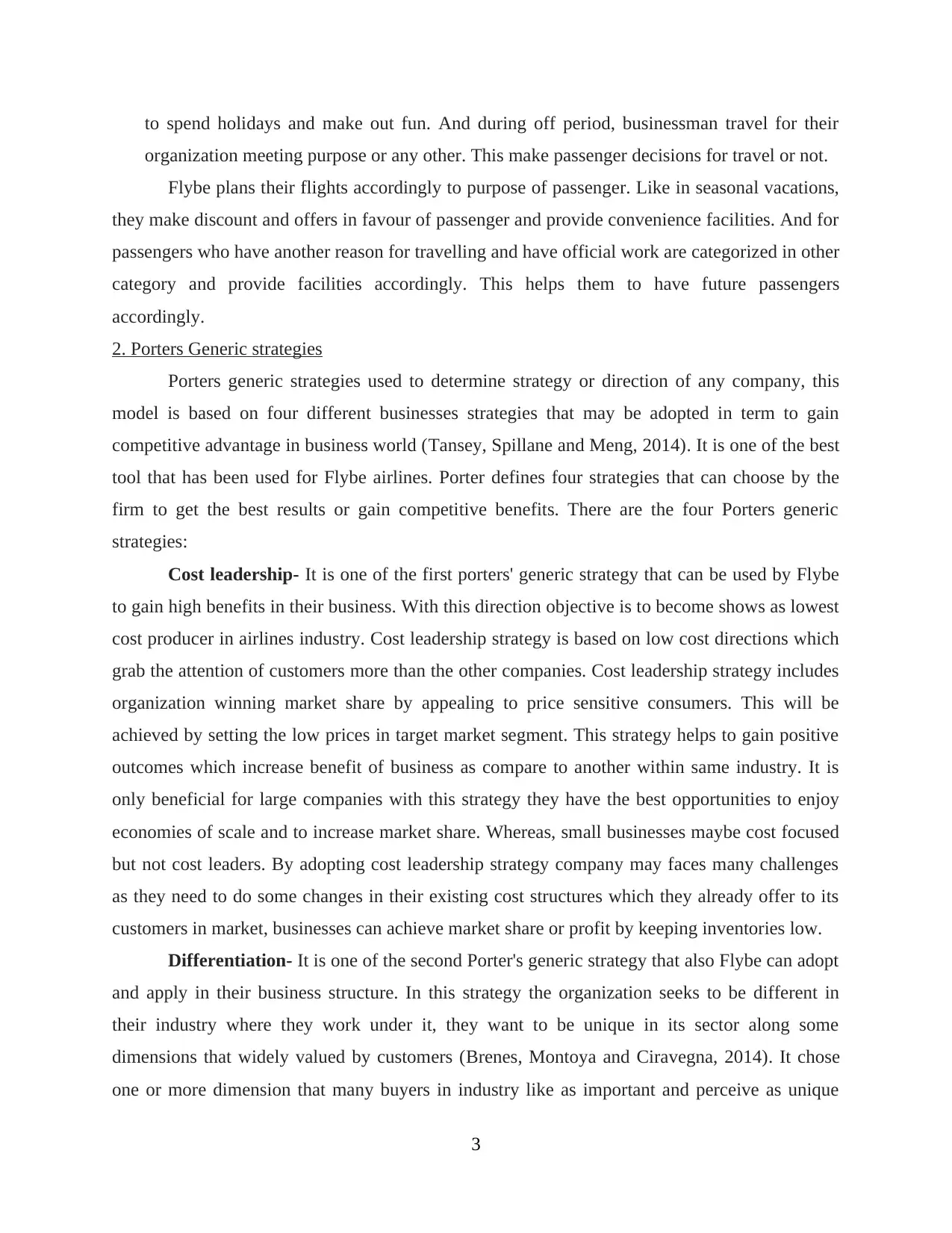
to spend holidays and make out fun. And during off period, businessman travel for their
organization meeting purpose or any other. This make passenger decisions for travel or not.
Flybe plans their flights accordingly to purpose of passenger. Like in seasonal vacations,
they make discount and offers in favour of passenger and provide convenience facilities. And for
passengers who have another reason for travelling and have official work are categorized in other
category and provide facilities accordingly. This helps them to have future passengers
accordingly.
2. Porters Generic strategies
Porters generic strategies used to determine strategy or direction of any company, this
model is based on four different businesses strategies that may be adopted in term to gain
competitive advantage in business world (Tansey, Spillane and Meng, 2014). It is one of the best
tool that has been used for Flybe airlines. Porter defines four strategies that can choose by the
firm to get the best results or gain competitive benefits. There are the four Porters generic
strategies:
Cost leadership- It is one of the first porters' generic strategy that can be used by Flybe
to gain high benefits in their business. With this direction objective is to become shows as lowest
cost producer in airlines industry. Cost leadership strategy is based on low cost directions which
grab the attention of customers more than the other companies. Cost leadership strategy includes
organization winning market share by appealing to price sensitive consumers. This will be
achieved by setting the low prices in target market segment. This strategy helps to gain positive
outcomes which increase benefit of business as compare to another within same industry. It is
only beneficial for large companies with this strategy they have the best opportunities to enjoy
economies of scale and to increase market share. Whereas, small businesses maybe cost focused
but not cost leaders. By adopting cost leadership strategy company may faces many challenges
as they need to do some changes in their existing cost structures which they already offer to its
customers in market, businesses can achieve market share or profit by keeping inventories low.
Differentiation- It is one of the second Porter's generic strategy that also Flybe can adopt
and apply in their business structure. In this strategy the organization seeks to be different in
their industry where they work under it, they want to be unique in its sector along some
dimensions that widely valued by customers (Brenes, Montoya and Ciravegna, 2014). It chose
one or more dimension that many buyers in industry like as important and perceive as unique
3
organization meeting purpose or any other. This make passenger decisions for travel or not.
Flybe plans their flights accordingly to purpose of passenger. Like in seasonal vacations,
they make discount and offers in favour of passenger and provide convenience facilities. And for
passengers who have another reason for travelling and have official work are categorized in other
category and provide facilities accordingly. This helps them to have future passengers
accordingly.
2. Porters Generic strategies
Porters generic strategies used to determine strategy or direction of any company, this
model is based on four different businesses strategies that may be adopted in term to gain
competitive advantage in business world (Tansey, Spillane and Meng, 2014). It is one of the best
tool that has been used for Flybe airlines. Porter defines four strategies that can choose by the
firm to get the best results or gain competitive benefits. There are the four Porters generic
strategies:
Cost leadership- It is one of the first porters' generic strategy that can be used by Flybe
to gain high benefits in their business. With this direction objective is to become shows as lowest
cost producer in airlines industry. Cost leadership strategy is based on low cost directions which
grab the attention of customers more than the other companies. Cost leadership strategy includes
organization winning market share by appealing to price sensitive consumers. This will be
achieved by setting the low prices in target market segment. This strategy helps to gain positive
outcomes which increase benefit of business as compare to another within same industry. It is
only beneficial for large companies with this strategy they have the best opportunities to enjoy
economies of scale and to increase market share. Whereas, small businesses maybe cost focused
but not cost leaders. By adopting cost leadership strategy company may faces many challenges
as they need to do some changes in their existing cost structures which they already offer to its
customers in market, businesses can achieve market share or profit by keeping inventories low.
Differentiation- It is one of the second Porter's generic strategy that also Flybe can adopt
and apply in their business structure. In this strategy the organization seeks to be different in
their industry where they work under it, they want to be unique in its sector along some
dimensions that widely valued by customers (Brenes, Montoya and Ciravegna, 2014). It chose
one or more dimension that many buyers in industry like as important and perceive as unique
3
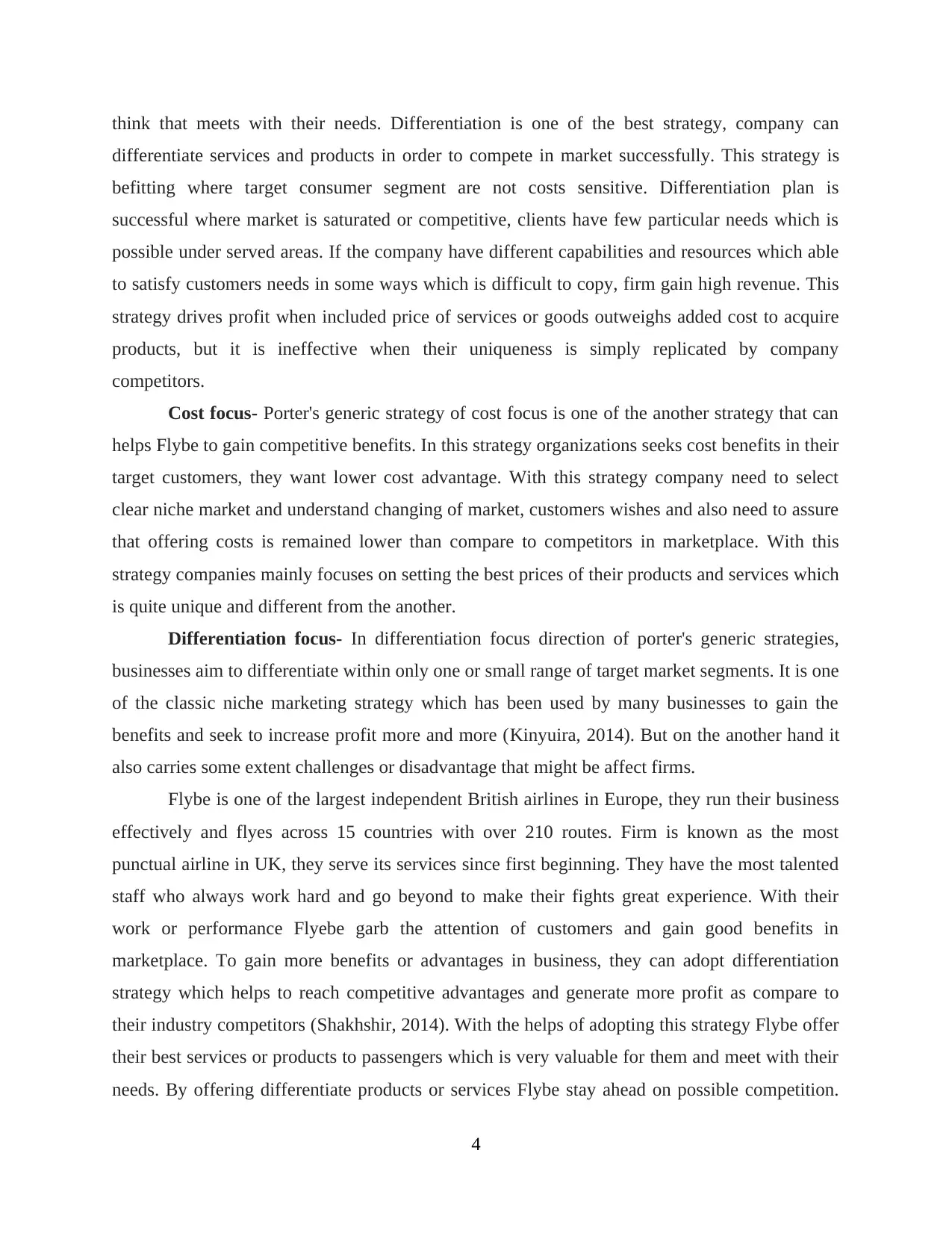
think that meets with their needs. Differentiation is one of the best strategy, company can
differentiate services and products in order to compete in market successfully. This strategy is
befitting where target consumer segment are not costs sensitive. Differentiation plan is
successful where market is saturated or competitive, clients have few particular needs which is
possible under served areas. If the company have different capabilities and resources which able
to satisfy customers needs in some ways which is difficult to copy, firm gain high revenue. This
strategy drives profit when included price of services or goods outweighs added cost to acquire
products, but it is ineffective when their uniqueness is simply replicated by company
competitors.
Cost focus- Porter's generic strategy of cost focus is one of the another strategy that can
helps Flybe to gain competitive benefits. In this strategy organizations seeks cost benefits in their
target customers, they want lower cost advantage. With this strategy company need to select
clear niche market and understand changing of market, customers wishes and also need to assure
that offering costs is remained lower than compare to competitors in marketplace. With this
strategy companies mainly focuses on setting the best prices of their products and services which
is quite unique and different from the another.
Differentiation focus- In differentiation focus direction of porter's generic strategies,
businesses aim to differentiate within only one or small range of target market segments. It is one
of the classic niche marketing strategy which has been used by many businesses to gain the
benefits and seek to increase profit more and more (Kinyuira, 2014). But on the another hand it
also carries some extent challenges or disadvantage that might be affect firms.
Flybe is one of the largest independent British airlines in Europe, they run their business
effectively and flyes across 15 countries with over 210 routes. Firm is known as the most
punctual airline in UK, they serve its services since first beginning. They have the most talented
staff who always work hard and go beyond to make their fights great experience. With their
work or performance Flyebe garb the attention of customers and gain good benefits in
marketplace. To gain more benefits or advantages in business, they can adopt differentiation
strategy which helps to reach competitive advantages and generate more profit as compare to
their industry competitors (Shakhshir, 2014). With the helps of adopting this strategy Flybe offer
their best services or products to passengers which is very valuable for them and meet with their
needs. By offering differentiate products or services Flybe stay ahead on possible competition.
4
differentiate services and products in order to compete in market successfully. This strategy is
befitting where target consumer segment are not costs sensitive. Differentiation plan is
successful where market is saturated or competitive, clients have few particular needs which is
possible under served areas. If the company have different capabilities and resources which able
to satisfy customers needs in some ways which is difficult to copy, firm gain high revenue. This
strategy drives profit when included price of services or goods outweighs added cost to acquire
products, but it is ineffective when their uniqueness is simply replicated by company
competitors.
Cost focus- Porter's generic strategy of cost focus is one of the another strategy that can
helps Flybe to gain competitive benefits. In this strategy organizations seeks cost benefits in their
target customers, they want lower cost advantage. With this strategy company need to select
clear niche market and understand changing of market, customers wishes and also need to assure
that offering costs is remained lower than compare to competitors in marketplace. With this
strategy companies mainly focuses on setting the best prices of their products and services which
is quite unique and different from the another.
Differentiation focus- In differentiation focus direction of porter's generic strategies,
businesses aim to differentiate within only one or small range of target market segments. It is one
of the classic niche marketing strategy which has been used by many businesses to gain the
benefits and seek to increase profit more and more (Kinyuira, 2014). But on the another hand it
also carries some extent challenges or disadvantage that might be affect firms.
Flybe is one of the largest independent British airlines in Europe, they run their business
effectively and flyes across 15 countries with over 210 routes. Firm is known as the most
punctual airline in UK, they serve its services since first beginning. They have the most talented
staff who always work hard and go beyond to make their fights great experience. With their
work or performance Flyebe garb the attention of customers and gain good benefits in
marketplace. To gain more benefits or advantages in business, they can adopt differentiation
strategy which helps to reach competitive advantages and generate more profit as compare to
their industry competitors (Shakhshir, 2014). With the helps of adopting this strategy Flybe offer
their best services or products to passengers which is very valuable for them and meet with their
needs. By offering differentiate products or services Flybe stay ahead on possible competition.
4
⊘ This is a preview!⊘
Do you want full access?
Subscribe today to unlock all pages.

Trusted by 1+ million students worldwide
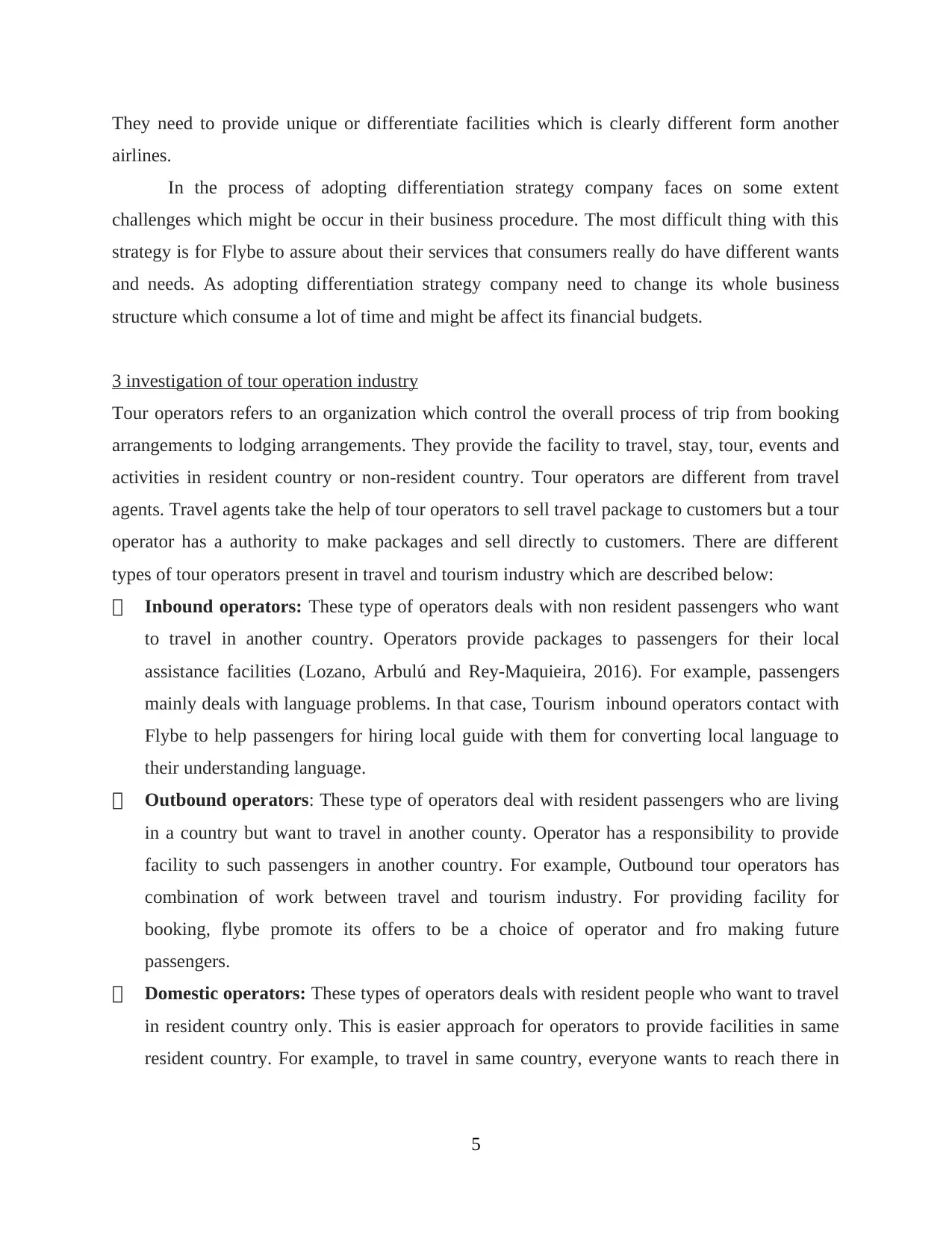
They need to provide unique or differentiate facilities which is clearly different form another
airlines.
In the process of adopting differentiation strategy company faces on some extent
challenges which might be occur in their business procedure. The most difficult thing with this
strategy is for Flybe to assure about their services that consumers really do have different wants
and needs. As adopting differentiation strategy company need to change its whole business
structure which consume a lot of time and might be affect its financial budgets.
3 investigation of tour operation industry
Tour operators refers to an organization which control the overall process of trip from booking
arrangements to lodging arrangements. They provide the facility to travel, stay, tour, events and
activities in resident country or non-resident country. Tour operators are different from travel
agents. Travel agents take the help of tour operators to sell travel package to customers but a tour
operator has a authority to make packages and sell directly to customers. There are different
types of tour operators present in travel and tourism industry which are described below:
Inbound operators: These type of operators deals with non resident passengers who want
to travel in another country. Operators provide packages to passengers for their local
assistance facilities (Lozano, Arbulú and Rey-Maquieira, 2016). For example, passengers
mainly deals with language problems. In that case, Tourism inbound operators contact with
Flybe to help passengers for hiring local guide with them for converting local language to
their understanding language.
Outbound operators: These type of operators deal with resident passengers who are living
in a country but want to travel in another county. Operator has a responsibility to provide
facility to such passengers in another country. For example, Outbound tour operators has
combination of work between travel and tourism industry. For providing facility for
booking, flybe promote its offers to be a choice of operator and fro making future
passengers.
Domestic operators: These types of operators deals with resident people who want to travel
in resident country only. This is easier approach for operators to provide facilities in same
resident country. For example, to travel in same country, everyone wants to reach there in
5
airlines.
In the process of adopting differentiation strategy company faces on some extent
challenges which might be occur in their business procedure. The most difficult thing with this
strategy is for Flybe to assure about their services that consumers really do have different wants
and needs. As adopting differentiation strategy company need to change its whole business
structure which consume a lot of time and might be affect its financial budgets.
3 investigation of tour operation industry
Tour operators refers to an organization which control the overall process of trip from booking
arrangements to lodging arrangements. They provide the facility to travel, stay, tour, events and
activities in resident country or non-resident country. Tour operators are different from travel
agents. Travel agents take the help of tour operators to sell travel package to customers but a tour
operator has a authority to make packages and sell directly to customers. There are different
types of tour operators present in travel and tourism industry which are described below:
Inbound operators: These type of operators deals with non resident passengers who want
to travel in another country. Operators provide packages to passengers for their local
assistance facilities (Lozano, Arbulú and Rey-Maquieira, 2016). For example, passengers
mainly deals with language problems. In that case, Tourism inbound operators contact with
Flybe to help passengers for hiring local guide with them for converting local language to
their understanding language.
Outbound operators: These type of operators deal with resident passengers who are living
in a country but want to travel in another county. Operator has a responsibility to provide
facility to such passengers in another country. For example, Outbound tour operators has
combination of work between travel and tourism industry. For providing facility for
booking, flybe promote its offers to be a choice of operator and fro making future
passengers.
Domestic operators: These types of operators deals with resident people who want to travel
in resident country only. This is easier approach for operators to provide facilities in same
resident country. For example, to travel in same country, everyone wants to reach there in
5
Paraphrase This Document
Need a fresh take? Get an instant paraphrase of this document with our AI Paraphraser
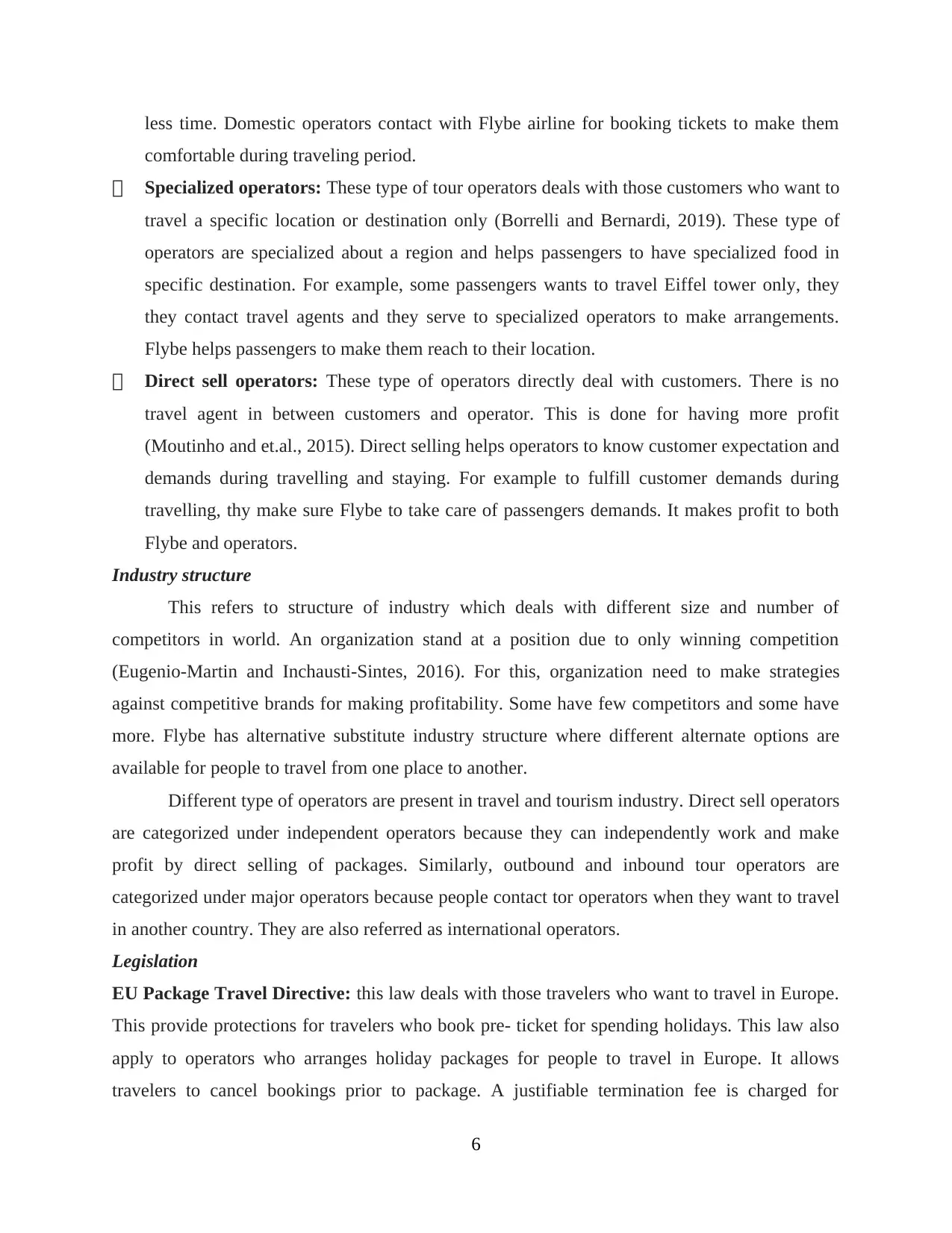
less time. Domestic operators contact with Flybe airline for booking tickets to make them
comfortable during traveling period.
Specialized operators: These type of tour operators deals with those customers who want to
travel a specific location or destination only (Borrelli and Bernardi, 2019). These type of
operators are specialized about a region and helps passengers to have specialized food in
specific destination. For example, some passengers wants to travel Eiffel tower only, they
they contact travel agents and they serve to specialized operators to make arrangements.
Flybe helps passengers to make them reach to their location.
Direct sell operators: These type of operators directly deal with customers. There is no
travel agent in between customers and operator. This is done for having more profit
(Moutinho and et.al., 2015). Direct selling helps operators to know customer expectation and
demands during travelling and staying. For example to fulfill customer demands during
travelling, thy make sure Flybe to take care of passengers demands. It makes profit to both
Flybe and operators.
Industry structure
This refers to structure of industry which deals with different size and number of
competitors in world. An organization stand at a position due to only winning competition
(Eugenio-Martin and Inchausti-Sintes, 2016). For this, organization need to make strategies
against competitive brands for making profitability. Some have few competitors and some have
more. Flybe has alternative substitute industry structure where different alternate options are
available for people to travel from one place to another.
Different type of operators are present in travel and tourism industry. Direct sell operators
are categorized under independent operators because they can independently work and make
profit by direct selling of packages. Similarly, outbound and inbound tour operators are
categorized under major operators because people contact tor operators when they want to travel
in another country. They are also referred as international operators.
Legislation
EU Package Travel Directive: this law deals with those travelers who want to travel in Europe.
This provide protections for travelers who book pre- ticket for spending holidays. This law also
apply to operators who arranges holiday packages for people to travel in Europe. It allows
travelers to cancel bookings prior to package. A justifiable termination fee is charged for
6
comfortable during traveling period.
Specialized operators: These type of tour operators deals with those customers who want to
travel a specific location or destination only (Borrelli and Bernardi, 2019). These type of
operators are specialized about a region and helps passengers to have specialized food in
specific destination. For example, some passengers wants to travel Eiffel tower only, they
they contact travel agents and they serve to specialized operators to make arrangements.
Flybe helps passengers to make them reach to their location.
Direct sell operators: These type of operators directly deal with customers. There is no
travel agent in between customers and operator. This is done for having more profit
(Moutinho and et.al., 2015). Direct selling helps operators to know customer expectation and
demands during travelling and staying. For example to fulfill customer demands during
travelling, thy make sure Flybe to take care of passengers demands. It makes profit to both
Flybe and operators.
Industry structure
This refers to structure of industry which deals with different size and number of
competitors in world. An organization stand at a position due to only winning competition
(Eugenio-Martin and Inchausti-Sintes, 2016). For this, organization need to make strategies
against competitive brands for making profitability. Some have few competitors and some have
more. Flybe has alternative substitute industry structure where different alternate options are
available for people to travel from one place to another.
Different type of operators are present in travel and tourism industry. Direct sell operators
are categorized under independent operators because they can independently work and make
profit by direct selling of packages. Similarly, outbound and inbound tour operators are
categorized under major operators because people contact tor operators when they want to travel
in another country. They are also referred as international operators.
Legislation
EU Package Travel Directive: this law deals with those travelers who want to travel in Europe.
This provide protections for travelers who book pre- ticket for spending holidays. This law also
apply to operators who arranges holiday packages for people to travel in Europe. It allows
travelers to cancel bookings prior to package. A justifiable termination fee is charged for
6
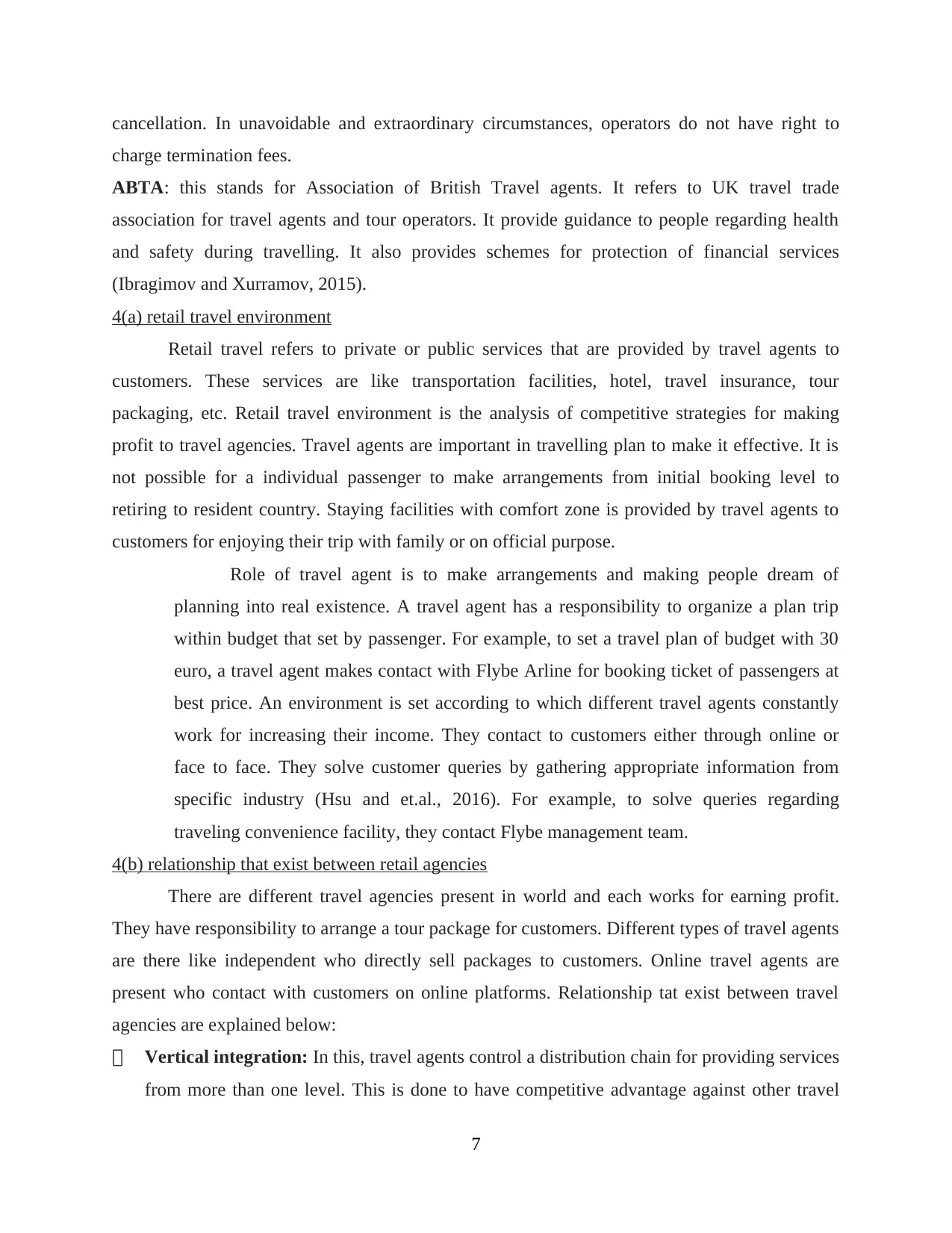
cancellation. In unavoidable and extraordinary circumstances, operators do not have right to
charge termination fees.
ABTA: this stands for Association of British Travel agents. It refers to UK travel trade
association for travel agents and tour operators. It provide guidance to people regarding health
and safety during travelling. It also provides schemes for protection of financial services
(Ibragimov and Xurramov, 2015).
4(a) retail travel environment
Retail travel refers to private or public services that are provided by travel agents to
customers. These services are like transportation facilities, hotel, travel insurance, tour
packaging, etc. Retail travel environment is the analysis of competitive strategies for making
profit to travel agencies. Travel agents are important in travelling plan to make it effective. It is
not possible for a individual passenger to make arrangements from initial booking level to
retiring to resident country. Staying facilities with comfort zone is provided by travel agents to
customers for enjoying their trip with family or on official purpose.
Role of travel agent is to make arrangements and making people dream of
planning into real existence. A travel agent has a responsibility to organize a plan trip
within budget that set by passenger. For example, to set a travel plan of budget with 30
euro, a travel agent makes contact with Flybe Arline for booking ticket of passengers at
best price. An environment is set according to which different travel agents constantly
work for increasing their income. They contact to customers either through online or
face to face. They solve customer queries by gathering appropriate information from
specific industry (Hsu and et.al., 2016). For example, to solve queries regarding
traveling convenience facility, they contact Flybe management team.
4(b) relationship that exist between retail agencies
There are different travel agencies present in world and each works for earning profit.
They have responsibility to arrange a tour package for customers. Different types of travel agents
are there like independent who directly sell packages to customers. Online travel agents are
present who contact with customers on online platforms. Relationship tat exist between travel
agencies are explained below:
Vertical integration: In this, travel agents control a distribution chain for providing services
from more than one level. This is done to have competitive advantage against other travel
7
charge termination fees.
ABTA: this stands for Association of British Travel agents. It refers to UK travel trade
association for travel agents and tour operators. It provide guidance to people regarding health
and safety during travelling. It also provides schemes for protection of financial services
(Ibragimov and Xurramov, 2015).
4(a) retail travel environment
Retail travel refers to private or public services that are provided by travel agents to
customers. These services are like transportation facilities, hotel, travel insurance, tour
packaging, etc. Retail travel environment is the analysis of competitive strategies for making
profit to travel agencies. Travel agents are important in travelling plan to make it effective. It is
not possible for a individual passenger to make arrangements from initial booking level to
retiring to resident country. Staying facilities with comfort zone is provided by travel agents to
customers for enjoying their trip with family or on official purpose.
Role of travel agent is to make arrangements and making people dream of
planning into real existence. A travel agent has a responsibility to organize a plan trip
within budget that set by passenger. For example, to set a travel plan of budget with 30
euro, a travel agent makes contact with Flybe Arline for booking ticket of passengers at
best price. An environment is set according to which different travel agents constantly
work for increasing their income. They contact to customers either through online or
face to face. They solve customer queries by gathering appropriate information from
specific industry (Hsu and et.al., 2016). For example, to solve queries regarding
traveling convenience facility, they contact Flybe management team.
4(b) relationship that exist between retail agencies
There are different travel agencies present in world and each works for earning profit.
They have responsibility to arrange a tour package for customers. Different types of travel agents
are there like independent who directly sell packages to customers. Online travel agents are
present who contact with customers on online platforms. Relationship tat exist between travel
agencies are explained below:
Vertical integration: In this, travel agents control a distribution chain for providing services
from more than one level. This is done to have competitive advantage against other travel
7
⊘ This is a preview!⊘
Do you want full access?
Subscribe today to unlock all pages.

Trusted by 1+ million students worldwide
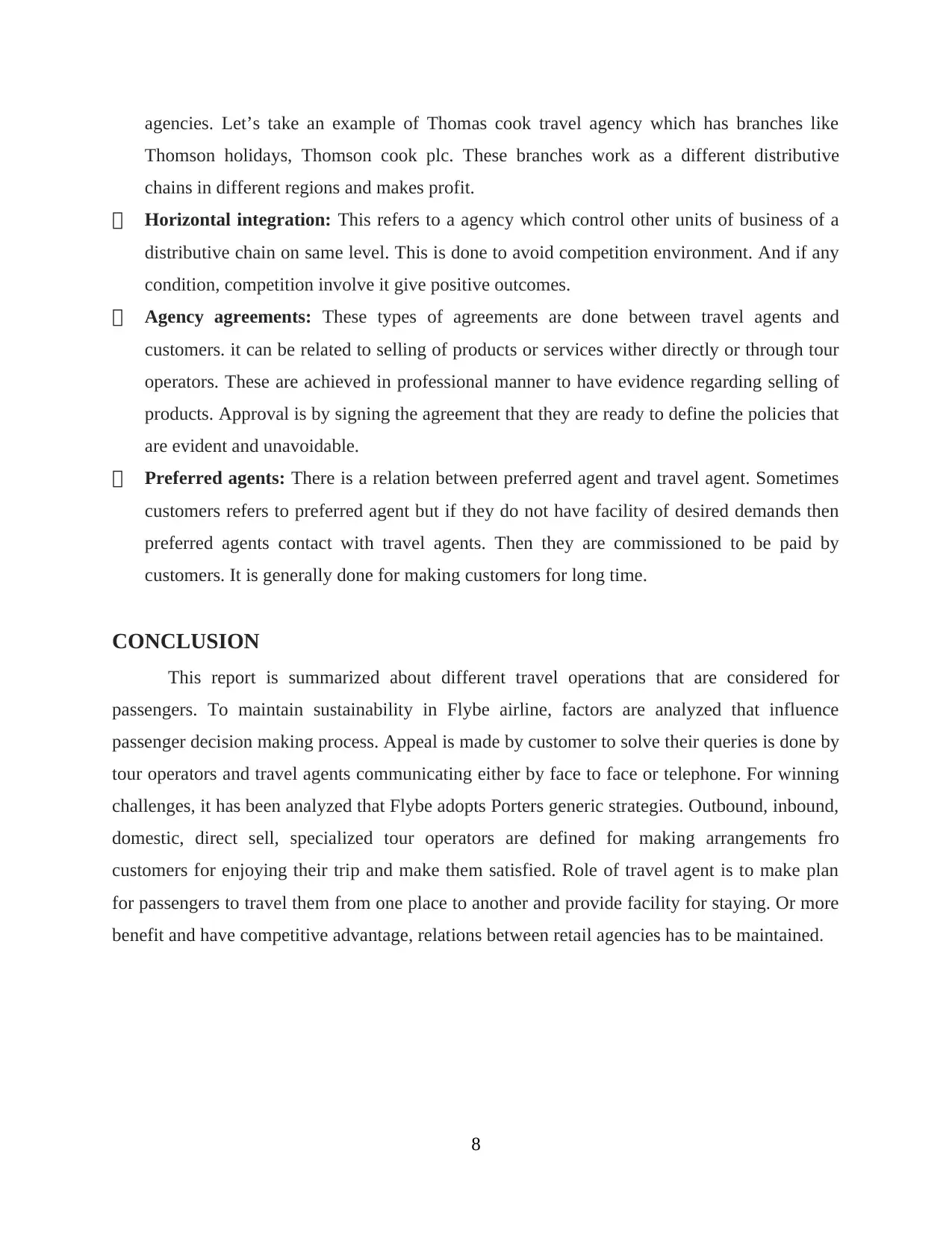
agencies. Let’s take an example of Thomas cook travel agency which has branches like
Thomson holidays, Thomson cook plc. These branches work as a different distributive
chains in different regions and makes profit.
Horizontal integration: This refers to a agency which control other units of business of a
distributive chain on same level. This is done to avoid competition environment. And if any
condition, competition involve it give positive outcomes.
Agency agreements: These types of agreements are done between travel agents and
customers. it can be related to selling of products or services wither directly or through tour
operators. These are achieved in professional manner to have evidence regarding selling of
products. Approval is by signing the agreement that they are ready to define the policies that
are evident and unavoidable.
Preferred agents: There is a relation between preferred agent and travel agent. Sometimes
customers refers to preferred agent but if they do not have facility of desired demands then
preferred agents contact with travel agents. Then they are commissioned to be paid by
customers. It is generally done for making customers for long time.
CONCLUSION
This report is summarized about different travel operations that are considered for
passengers. To maintain sustainability in Flybe airline, factors are analyzed that influence
passenger decision making process. Appeal is made by customer to solve their queries is done by
tour operators and travel agents communicating either by face to face or telephone. For winning
challenges, it has been analyzed that Flybe adopts Porters generic strategies. Outbound, inbound,
domestic, direct sell, specialized tour operators are defined for making arrangements fro
customers for enjoying their trip and make them satisfied. Role of travel agent is to make plan
for passengers to travel them from one place to another and provide facility for staying. Or more
benefit and have competitive advantage, relations between retail agencies has to be maintained.
8
Thomson holidays, Thomson cook plc. These branches work as a different distributive
chains in different regions and makes profit.
Horizontal integration: This refers to a agency which control other units of business of a
distributive chain on same level. This is done to avoid competition environment. And if any
condition, competition involve it give positive outcomes.
Agency agreements: These types of agreements are done between travel agents and
customers. it can be related to selling of products or services wither directly or through tour
operators. These are achieved in professional manner to have evidence regarding selling of
products. Approval is by signing the agreement that they are ready to define the policies that
are evident and unavoidable.
Preferred agents: There is a relation between preferred agent and travel agent. Sometimes
customers refers to preferred agent but if they do not have facility of desired demands then
preferred agents contact with travel agents. Then they are commissioned to be paid by
customers. It is generally done for making customers for long time.
CONCLUSION
This report is summarized about different travel operations that are considered for
passengers. To maintain sustainability in Flybe airline, factors are analyzed that influence
passenger decision making process. Appeal is made by customer to solve their queries is done by
tour operators and travel agents communicating either by face to face or telephone. For winning
challenges, it has been analyzed that Flybe adopts Porters generic strategies. Outbound, inbound,
domestic, direct sell, specialized tour operators are defined for making arrangements fro
customers for enjoying their trip and make them satisfied. Role of travel agent is to make plan
for passengers to travel them from one place to another and provide facility for staying. Or more
benefit and have competitive advantage, relations between retail agencies has to be maintained.
8
Paraphrase This Document
Need a fresh take? Get an instant paraphrase of this document with our AI Paraphraser
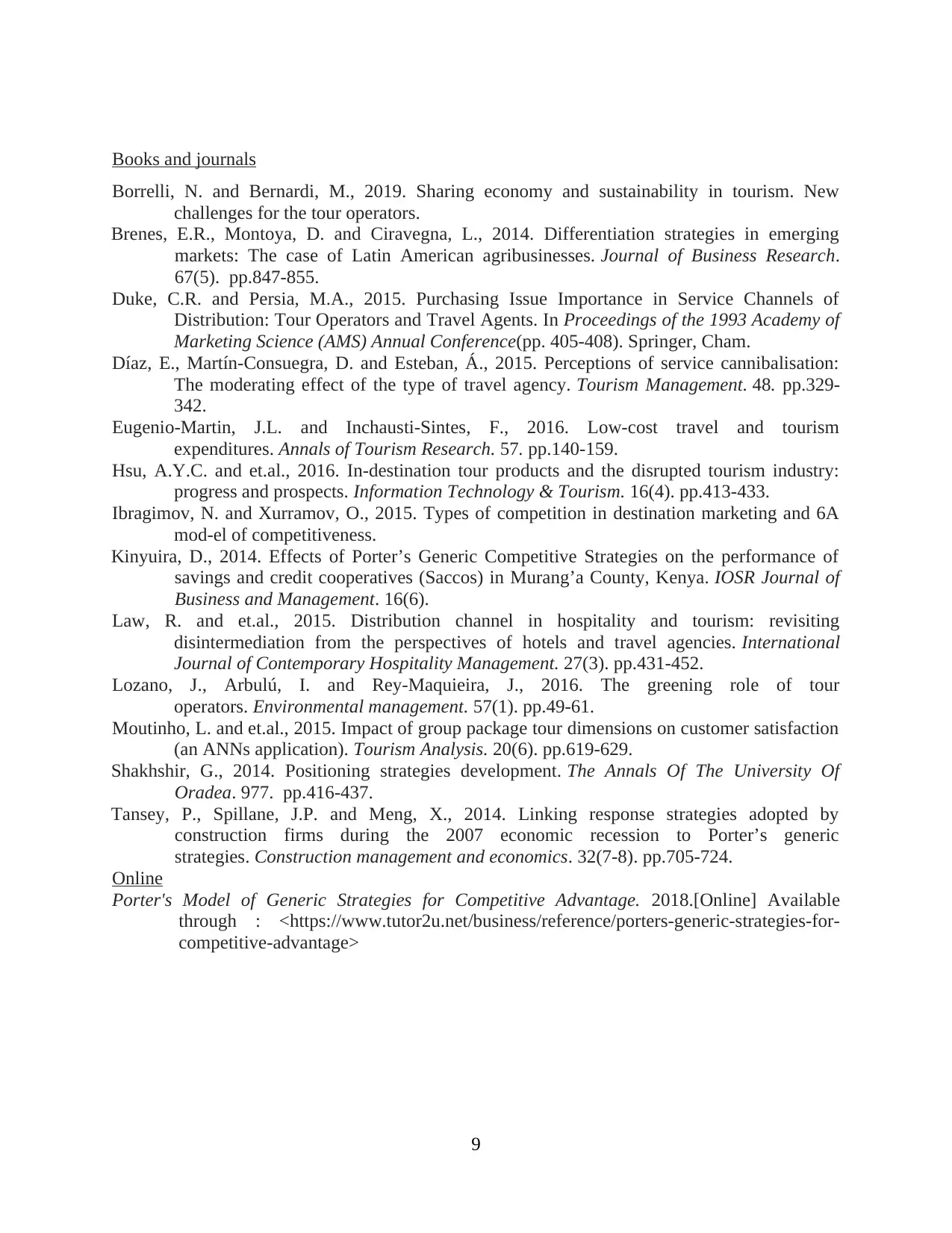
Books and journals
Borrelli, N. and Bernardi, M., 2019. Sharing economy and sustainability in tourism. New
challenges for the tour operators.
Brenes, E.R., Montoya, D. and Ciravegna, L., 2014. Differentiation strategies in emerging
markets: The case of Latin American agribusinesses. Journal of Business Research.
67(5). pp.847-855.
Duke, C.R. and Persia, M.A., 2015. Purchasing Issue Importance in Service Channels of
Distribution: Tour Operators and Travel Agents. In Proceedings of the 1993 Academy of
Marketing Science (AMS) Annual Conference(pp. 405-408). Springer, Cham.
Díaz, E., Martín-Consuegra, D. and Esteban, Á., 2015. Perceptions of service cannibalisation:
The moderating effect of the type of travel agency. Tourism Management. 48. pp.329-
342.
Eugenio-Martin, J.L. and Inchausti-Sintes, F., 2016. Low-cost travel and tourism
expenditures. Annals of Tourism Research. 57. pp.140-159.
Hsu, A.Y.C. and et.al., 2016. In-destination tour products and the disrupted tourism industry:
progress and prospects. Information Technology & Tourism. 16(4). pp.413-433.
Ibragimov, N. and Xurramov, O., 2015. Types of competition in destination marketing and 6A
mod-el of competitiveness.
Kinyuira, D., 2014. Effects of Porter’s Generic Competitive Strategies on the performance of
savings and credit cooperatives (Saccos) in Murang’a County, Kenya. IOSR Journal of
Business and Management. 16(6).
Law, R. and et.al., 2015. Distribution channel in hospitality and tourism: revisiting
disintermediation from the perspectives of hotels and travel agencies. International
Journal of Contemporary Hospitality Management. 27(3). pp.431-452.
Lozano, J., Arbulú, I. and Rey-Maquieira, J., 2016. The greening role of tour
operators. Environmental management. 57(1). pp.49-61.
Moutinho, L. and et.al., 2015. Impact of group package tour dimensions on customer satisfaction
(an ANNs application). Tourism Analysis. 20(6). pp.619-629.
Shakhshir, G., 2014. Positioning strategies development. The Annals Of The University Of
Oradea. 977. pp.416-437.
Tansey, P., Spillane, J.P. and Meng, X., 2014. Linking response strategies adopted by
construction firms during the 2007 economic recession to Porter’s generic
strategies. Construction management and economics. 32(7-8). pp.705-724.
Online
Porter's Model of Generic Strategies for Competitive Advantage. 2018.[Online] Available
through : <https://www.tutor2u.net/business/reference/porters-generic-strategies-for-
competitive-advantage>
9
Borrelli, N. and Bernardi, M., 2019. Sharing economy and sustainability in tourism. New
challenges for the tour operators.
Brenes, E.R., Montoya, D. and Ciravegna, L., 2014. Differentiation strategies in emerging
markets: The case of Latin American agribusinesses. Journal of Business Research.
67(5). pp.847-855.
Duke, C.R. and Persia, M.A., 2015. Purchasing Issue Importance in Service Channels of
Distribution: Tour Operators and Travel Agents. In Proceedings of the 1993 Academy of
Marketing Science (AMS) Annual Conference(pp. 405-408). Springer, Cham.
Díaz, E., Martín-Consuegra, D. and Esteban, Á., 2015. Perceptions of service cannibalisation:
The moderating effect of the type of travel agency. Tourism Management. 48. pp.329-
342.
Eugenio-Martin, J.L. and Inchausti-Sintes, F., 2016. Low-cost travel and tourism
expenditures. Annals of Tourism Research. 57. pp.140-159.
Hsu, A.Y.C. and et.al., 2016. In-destination tour products and the disrupted tourism industry:
progress and prospects. Information Technology & Tourism. 16(4). pp.413-433.
Ibragimov, N. and Xurramov, O., 2015. Types of competition in destination marketing and 6A
mod-el of competitiveness.
Kinyuira, D., 2014. Effects of Porter’s Generic Competitive Strategies on the performance of
savings and credit cooperatives (Saccos) in Murang’a County, Kenya. IOSR Journal of
Business and Management. 16(6).
Law, R. and et.al., 2015. Distribution channel in hospitality and tourism: revisiting
disintermediation from the perspectives of hotels and travel agencies. International
Journal of Contemporary Hospitality Management. 27(3). pp.431-452.
Lozano, J., Arbulú, I. and Rey-Maquieira, J., 2016. The greening role of tour
operators. Environmental management. 57(1). pp.49-61.
Moutinho, L. and et.al., 2015. Impact of group package tour dimensions on customer satisfaction
(an ANNs application). Tourism Analysis. 20(6). pp.619-629.
Shakhshir, G., 2014. Positioning strategies development. The Annals Of The University Of
Oradea. 977. pp.416-437.
Tansey, P., Spillane, J.P. and Meng, X., 2014. Linking response strategies adopted by
construction firms during the 2007 economic recession to Porter’s generic
strategies. Construction management and economics. 32(7-8). pp.705-724.
Online
Porter's Model of Generic Strategies for Competitive Advantage. 2018.[Online] Available
through : <https://www.tutor2u.net/business/reference/porters-generic-strategies-for-
competitive-advantage>
9

10
⊘ This is a preview!⊘
Do you want full access?
Subscribe today to unlock all pages.

Trusted by 1+ million students worldwide
1 out of 16
Related Documents
Your All-in-One AI-Powered Toolkit for Academic Success.
+13062052269
info@desklib.com
Available 24*7 on WhatsApp / Email
![[object Object]](/_next/static/media/star-bottom.7253800d.svg)
Unlock your academic potential
Copyright © 2020–2026 A2Z Services. All Rights Reserved. Developed and managed by ZUCOL.





